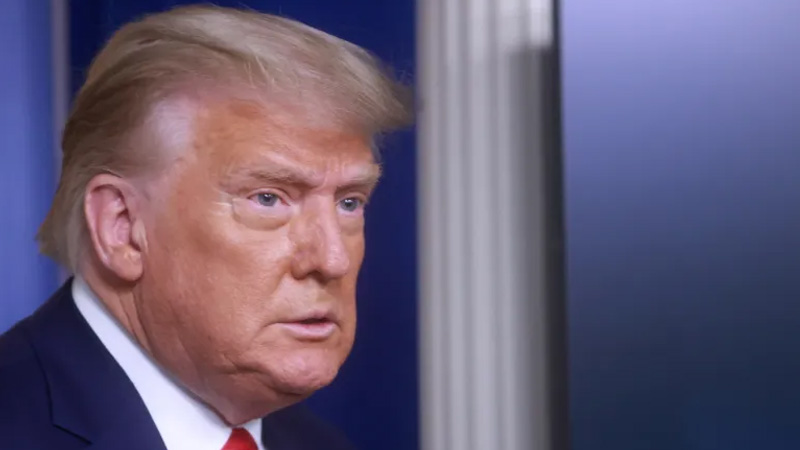Donald Trump recently took to social media to share a series of Easter messages, with the latest one standing out for its pointed direction towards individuals he accuses of orchestrating a witch hunt against him. This message, although part of a festive communication, carried a tone that veered away from the usual Easter greetings, diving into the realm of personal grievances and political contention.
The term “witch hunt” is not new in political discourse, especially when it comes to Trump’s rhetoric. It has been used repeatedly to describe what he perceives as unjust and biased investigations or accusations aimed at discrediting him or his administration. This latest Easter message appears to be a continuation of that narrative, using the occasion to highlight his ongoing battle with adversaries.
Easter, a time traditionally associated with rebirth, forgiveness, and unity, seems to have taken on a different significance in this context. Instead of messages of hope and renewal, Trump’s communication carried a more defensive and combative tone, focusing on his struggles and conflicts. This approach to holiday messages is somewhat unconventional, as public figures typically use such occasions to convey messages of goodwill, peace, and solidarity.
HAPPY EASTER TO ALL, INCLUDING CROOKED AND CORRUPT PROSECUTORS AND JUDGES THAT ARE DOING EVERYTHING POSSIBLE TO INTERFERE WITH THE PRESIDENTIAL ELECTION OF 2024, AND PUT ME IN PRISON, INCLUDING THOSE MANY PEOPLE THAT I COMPLETELY & TOTALLY DESPISE BECAUSE THEY WANT TO DESTROY AMERICA, A NOW FAILING NATION, LIKE “DERANGED” JACK SMITH, WHO IS EVIL AND “SICK,” MRS. FANI “FAUNI” WADE, WHO SAID SHE HARDLY KNEW THE “SPECIAL” PROSECUTOR, ONLY TO FIND THAT HE SPENT YEARS “LOVING” HER, LONG BEFORE THE GEORGIA PERSECUTION OF PRESIDENT TRUMP BEGAN (AND THEREBY MAKING THE CASE AGAINST ME NULL, VOID, AND ILLEGAL!), AND LAZY ON VIOLENT CRIME ALVIN BRAGG WHO, WITH CROOKED JOE’S DOJ THUGS, UNFAIRLY WORKING IN THE D.A.’s OFFICE, ILLEGALLY INDICTED ME ON A CASE HE NEVER WANTED TO BRING AND VIRTUALLY ALL LEGAL SCHOLARS SAY IS A CASE THAT SHOULD NOT BE BROUGHT, IS BREAKING THE LAW IN DOING SO (POMERANTZ!), WAS TURNED DOWN BY ALL OTHER LAW ENFORCEMENT AUTHORITIES, AND IS NOT A CRIME. HAPPY EASTER EVERYONE!
The choice to use a religious and widely celebrated holiday like Easter to address personal and political grievances is a notable strategy. It reflects Trump’s continued engagement with his base, many of whom have supported him through various controversies and investigations. By framing his challenges as a “witch hunt,” he reinforces the narrative of being an outsider under siege, battling against a corrupt establishment. This resonates with a segment of the population that feels marginalized or ignored by the mainstream media and political elite.
However, this blending of personal vendettas with holiday greetings does raise questions about the appropriateness of such messages. Easter, for many, remains a sacred time for reflection, renewal, and family. Introducing political grievances into this context might not sit well with everyone, including some of his supporters who are looking for a respite from the continuous cycle of political discourse.
Furthermore, the use of such a platform to discuss political and personal grievances highlights the changing nature of political communication. Social media allows public figures to bypass traditional media outlets, speaking directly to their audience without filter or interpretation. This direct line of communication can be powerful but also blurs the lines between personal expression and public discourse.
In conclusion, Donald Trump’s latest Easter message is more than a seasonal greeting; it’s a reflection of his ongoing narrative and political strategy. By framing his challenges as a “witch hunt” and using a platform typically reserved for unity and celebration to air grievances, he continues to engage with his base in a manner that is both unconventional and indicative of the broader shifts in political communication. While this approach resonates with some, it also sparks debate about the intersection of personal grievances with public holiday messages, the role of social media in political discourse, and the evolving norms of communication from public figures.


